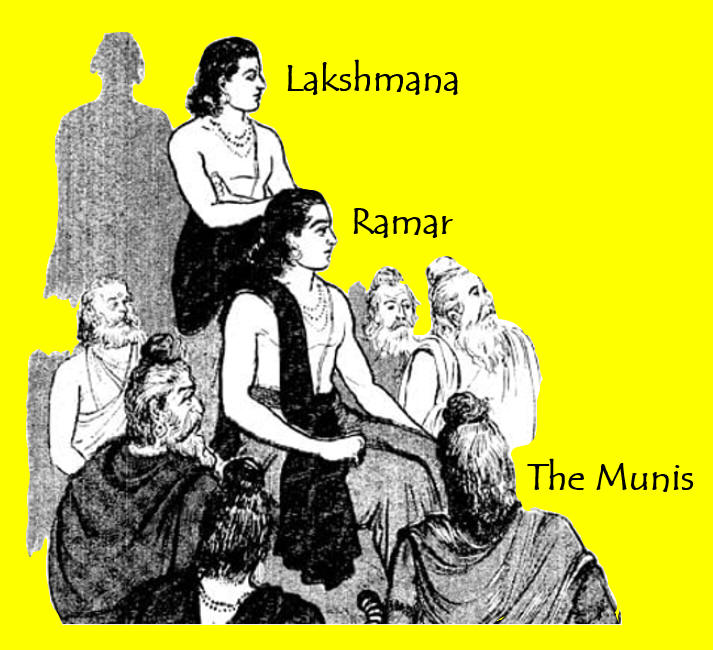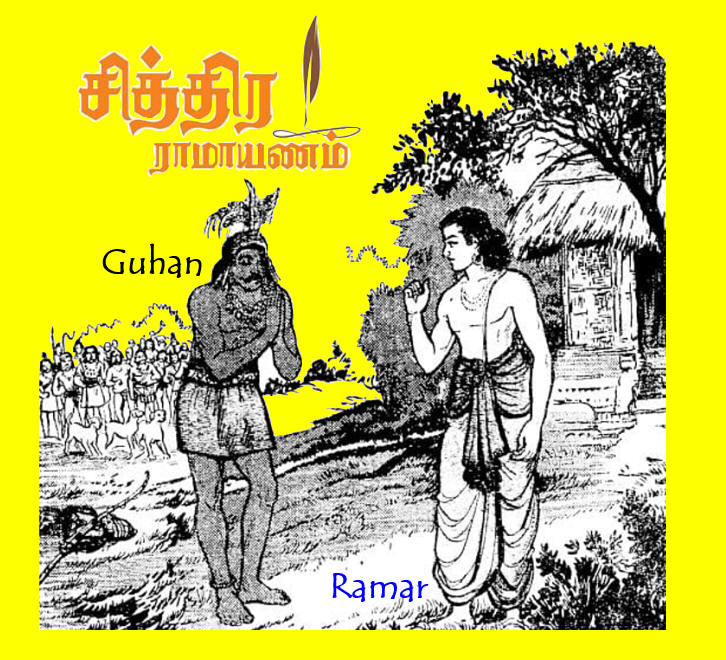2016-09-26ChitraRamanayanam03
Published:26 Sep 2016 8 PMUpdated:26 Sep 2016 8 PM Sakthi Vikatan
சித்திர ராமாயணம்
Vikatan Correspondent
Guhan the Boatman meets Rama
P.Sri., Images: Chitraloka


2. That dark moving cloud was not an ordinary person. He is the owner of the thousand boats that ply in all directions in the Ganga river. Without his help, no one can cross the Ganges river. His vocation is hereditary: plying the boats. As he holds his oar and his bow, he appears as the tormentor of the enemies and the beasts.
3. His name is Guhan. All over his locality, the clamor is he is a ‘warrior Guhan.’
4. Guhan, with a chest like a rock-slab, holds his bow on his rock-solid shoulders. The anklets appear like rocks.
5. Along the thighs, he wears short drawers; from the hips hang the red animal skin; a tiger tail wraps around his waist, holding the animal clothing in place. In the eyes of the hunter, the clothes and the belt look fashionable and status-worthy.
6. What are we to call those unique clothing? He has sheathed his sharp sword with bloodstains in his waist belt.
7. The sword, the bow, and the hero’s anklets appear unique and useful wearables. He wears a chain of seashells that resemble a lineup of his teeth. He has adorned his tuft of the darkest of dark hair with inserts of rice sheaves of grain-heads.
8. We see this forbidden figure coming near with a face that has never known a smile, the fire-emitting eyes evincing no provocative anger, and the look of a poisonous snake, causing tremors. Guhan speaks in a booming voice that instills shiver and fear and babbles like a lunatic.
9. Having come across the Ganges River, could he not have taken a dip in the river before his intrusion? Could he have not rinsed his mouth that ate the meat and drank the country liquor?
10. As Guhan neared the Asramam housing Ramar, Guhan undergoes a surprising change and stops his entourage. He sheds his bow and arrow, sword, and his meanness and fills his mind and soul with love. He knew the Asramam from before. He goes into an unknown sacred spot.
11. At entrances to the hermitage, he steps aside and shouts, ‘Servitor.’ Lakshmana came running to the door and enquires, ‘Who are you?’ The pointer is, ‘You had come as a bear when Deva Pujai was in progress.’ Mistaking Lakshmanan for Rama, Guhan offers his salutation and tells who he is.
12. The head of the hunters with power, prowess, and independent hubris addresses himself as 'a dog of a servitor.’
Having heard of the excellent qualities of Rama, he appreciates them. Entering several open doors and failing in his search, he came here as the dog of a servitor seeking refuge, love, and friendship, which Guhan could not get from the Munis but earned only fatigue from all the wonderings.
13. Read Kambar’s poems. Do you see the golden heart residing in the beastly body?
14. Appreciating and joyous of his calmness and self-control and his great affection to Rama, Lakshmanan experienced the impact of Guhan’s debonair as the riverside feels the crashing of Ganges’ waves. From his heart, mind, speech, and soul, Lakshmanan praises Guhan as a pure-hearted person, more virtuous than a mother. (Lakshmanan must have thought there exists in this world a mother like Kaikeyi.)
15. If Guhan is what you say he is, Ramar says with the joyous heart to bring him to him.
16. As Rama comes into his field of vision, Guhan’s heart, mind, and soul melt with love. Guhan falls prostrate at the feet of Ramar, gets up, and stands before Ramar with folded hand and covered mouth. What love and obedience! Where there is pure love, obedience is natural. Love and obedience are the two sides of a coin.
17. Refusing to sit at Rama’s suggestion, Guhan asks Ramar, ‘I have prepared fish and honey. Are you of the heart to eat them?’ Look at the ambiance where Guhan is standing and Ramar’s stance at seeing Guhan.
18. Hearing Guhan’s words, Ramar looks at the elderly Brahma Rishis and smiles. What is the meaning of this faint smile? There are no roots, fruits, and leaves, the subsistence for the Rishis. Guhan brings fish and honey to Raman in the hermitage. Is that ignorance? Is that Āsāram (proper conduct for the Rishis) to eat meat and fish? What is short of Āsāram? That is the meaning of the smile.
19. Does the fish and honey appear to Ramar in his eyes, as they are? Love and the pure heart are better than Deva’s Ambrosia, which Ramar sees, respects, and loves. Just see how Ramar shares his thoughts with the Rishis just by his faint smile.
20. If true love brings in the spirit of love, the dear, the rare and the agreeable, is it not superior to Amirtam? These victuals are suitable for us (Ramar). They are pure. Though we do not consume it, it is equal to having eaten them. Ramar says that.
21. So many feelings!
22. Rama says purity or Āsāram is that, embraced by love and compassion. Who else can better explain purity with brevity, beauty, and clarity? An entity unembraced by love and unmixed with mercy: where is its purity?
Where is Āsāram? The afore-mentioned aphorism in the previous passage is the opinion of Ramar as the Raja Rishi.
33. Kamban’s opinion is Guhan’s concept of love is the likable tenet. If the Tamil people realize this love and pursue the path of love, will untouchability not go away from this country?